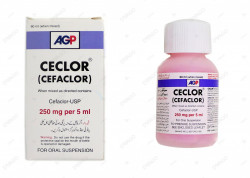Ceclor (cefaclor) Coupons, Discounts & Cost
Ceclor (cefaclor) is a broad-spectrum antibiotic from the group of second-generation cephalosporins. One way to save money on the Ceclor (cefaclor) retail cost regardless of income and insurance status is to use Ceclor (cefaclor) coupons or discount cards from RXCoupons. Use this Ceclor (cefaclor) coupon at this online pharmacy and receive up to 75% off the sale price.
What is Ceclor (cefaclor)?
Ceclor (cefaclor) is a broad-spectrum antibiotic from the group of second-generation cephalosporins. It has bactericidal activity against certain gram-negative bacteria (Escherichia coli, Haemophilus influenzae, Klebsiella pneumoniae, Salmonella spp., Shigella spp., Proteus mirabilis, Neisseria gonorrhoeae), gram-positive bacteria (Staphylococcus spp., Streptococcus spp.) and anaerobic bacteria (Peptostreptococcus spp., Bacteroides spp.). The drug is not active against Pseudomonas spp., Enterococcus spp., Enterobacter cloacae, methicillin-resistant Staphylococcus spp. and Listeria monocytogenes.
Cefaclor is well absorbed from the gastrointestinal tract. It is rapidly distributed in the body and can pass through the placental barrier. 85% of the administered dose is excreted in the urine (unchanged, within 8 hours).
When can I use Ceclor (cefaclor)?
This medication is used to treat infectious and inflammatory diseases caused by microorganisms sensitive to cefaclor: upper and lower respiratory tract diseases (including pneumonia), urinary tract infections (including pyelonephritis, cystitis, gonococcal urethritis), skin and soft tissue infections, otitis media, sinusitis, infections of bones and joints (including osteomyelitis), endometritis, gonorrhea.
Ceclor is contraindicated during pregnancy. Lactating women should interrupt or stop breastfeeding.
Ceclor (cefaclor) dosage
The dosage depends on the severity and localization of infection. Ceclor tablets should be taken with food or within 1 hour after meals.
The usual adult dose is 250-500 mg 3 times per day. The single dose in case of gonorrhea is 3 g. The usual dose for children is 20 mg/kg, the multiplicity of reception - 3 times per day. The course of treatment is 7-10 days.
The maximum doses for adults - 4 g per day, for children - 1.5 g per day.
What should I know about Ceclor (cefaclor) side effects?
CNS: dizziness, headache, agitation, anxiety, insomnia, paresthesia, motor agitation, confusion, hallucinations, fatigue. Digestive system: nausea, vomiting, diarrhea, cholestatic jaundice, hepatitis, pseudomembranous colitis, loss of appetite, constipation, dyspepsia, abdominal pain. Hematopoiesis: leukopenia, neutropenia, thrombocytopenia, hemolytic anemia. Allergic reactions: skin rash, pruritus, eosinophilia, angioedema, itching in the genital area, arthralgia, dizziness, conjunctivitis, Stevens-Johnson syndrome, toxic epidermal necrolysis (Lyell's syndrome), anaphylaxis. Circulatory system: hypoprothrombinemia. Urinary system: interstitial nephritis, vaginitis, renal failure, dysuria, nocturia. Other reactions: candidiasis.
Ceclor overdose symptoms include nausea, vomiting, diarrhea, abdominal cramps.
Ceclor (cefaclor) contraindications
Do not use this medication if you have hypersensitivity to cefaclor and other cephalosporins, severe kidney failure, leukopenia, hemorrhagic syndrome.
Use caution in renal impairment.
How to take Ceclor (cefaclor) during pregnancy and lactation
Patients may use Ceclor (cefaclor) during pregnancy only in cases where the expected benefit to the mother outweighs the potential risk to the fetus. Patients should stop breastfeeding during the whole period of treatment.
Ceclor (cefaclor) special instructions
Use this medication with caution in patients with renal impairment, diseases of the gastrointestinal tract (colitis).
Patients with hypersensitivity to penicillin may have allergic reactions to Ceclor (cephalosporin antibiotics).
In case of pregnancy, patients should weigh the potential benefits of the drug and the risk to the fetus. If necessary to use Ceclor during lactation, women should stop breastfeeding.
Ceclor therapy may result in false positive result of the direct antiglobulin test.
Ceclor (cefaclor) interactions
Cefaclor suppresses the intestinal flora. Therefore, it should not be used with drugs that reduce platelet aggregation (NSAIDs, salicylates, sulfinpyrazone), and anticoagulants.
Probenecid delays the excretion of cefaclor.

